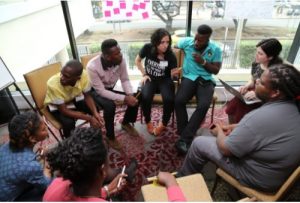FREE FLOW OF INFORMATION
An article from the UN Agency for Refugees (translated by CPNN)
The main challenges faced by young people in Latin America and the Caribbean are focused on issues of security, equity and governance – key elements for moving towards sustainable peace. In this context, 63 young people from different countries of the region participated in the first Regional Consultation on Youth, Peace and Security held between May 28 and June 1 in Panama City.

Caption: Maha, a young stateless person who participated in the Regional Consultation on Youth, Peace and Security, actively promotes the right of each person to have a nationality. Photo: Miguel Trancozo
The young people were selected as being agents of change in their respective countries as they work with other youth in search of a more just and prosperous society. Many of them belong to vulnerable groups and minorities, which motivates them to speak out for the changes they want to see in the world.
“When I was 15, I lost my father because of crime and violence,” says Tawana from St. Kitts and Nevis. “This was a wake-up call for me, so I decided to take a proactive role to make a difference. As soon as I return to my country, I will pass on to the young people everything that is happening in this consultation. For our country and our world, “said Tawana.
The consultation seeks to formulate proposals, based on a vision of peace and human security, with a broad participation of young people and with concrete actions, directed towards the fulfillment of Agenda 2030.
Georgeanela, a young woman from Costa Rica, points out that the most important thing is that each person has full entitlement to all human rights. That is why it is important for people to be educated with a sense of respect and tolerance in order to seek peace.
“My motivation is to formulate with other young people in the region a proposal for new opportunities and to take this opportunity to improve the quality of life for all people,” says Georgeanela.
Some proposals from young people aim to make use of new technologies and art to promote a culture of peace and security in the region.
(Article continued in the right column.)
(Click here for the original Portuguese version of this article.)
What is the United Nations doing for a culture of peace?
(Article continued from left column)
According to Ricardo, from El Salvador, we must recognize that there are many opportunities and initiatives that are started by youth. One of his best achievements was when, through the creation of workshops of hip hop and artistic expressions, he helped young people to avoid entering the gangs. He offered them a chance to express themselves through dance and used it as a tool for social transformation.
As a result of his work, Ricardo and his family were threatened and therefore forced to move. But this only served as an stimulus to continue to work to prevent young people from falling into the hands of organized crime.
Fanny, a trans woman from El Salvador, fights for the rights of the LGBTI community in the country.
“Being young in El Salvador is a crime, we do not have the freedom to express ourselves, we can not walk the streets freely without being stigmatized by our own community,” he said, “being young in El Salvador means that we are all members of gangs, we are all thieves.” Fanny explains how the situation of gangs and gangs affects youth. “Some young people were killed simply because they refused to be part of it.”
Young people who try to help other vulnerable youth become victims of threats and harassment.
For Heidy, from Guatemala, “peace is to leave home, to go to work, to return and to receive a hug from my mother, knowing that I have been able to return without being raped or beaten. Peace is the little things we can do in the midst of chaos “.
A person’s vision of peace depends on context and experiences. For Maha, a stateless young woman, peace is interior, is to achieve dreams and goals. “I lost my brother a year ago because of street violence. He was born and died stateless. I was born stateless, but I want to die belonging to a country.” Building on her experience, she advocates for the 10 million stateless people for the right to have a nationality. “It’s not about politics, it’s about people and their lives,” ahe says.
Many of the participants in the consultation are taking action to promote gender equality, respect for ethnic and cultural differences, the defense of social and reproductive rights, the building of democracy and the right to a nationality.
These young people return with the great task of continuing to act in the present, targeting the future they wish to build, committing themselves to continue to influence communities and their environments to ensure a safer, more peaceful and more inclusive region.